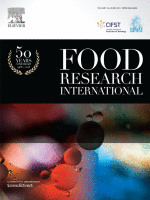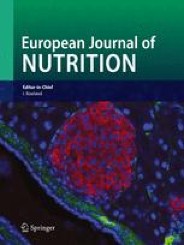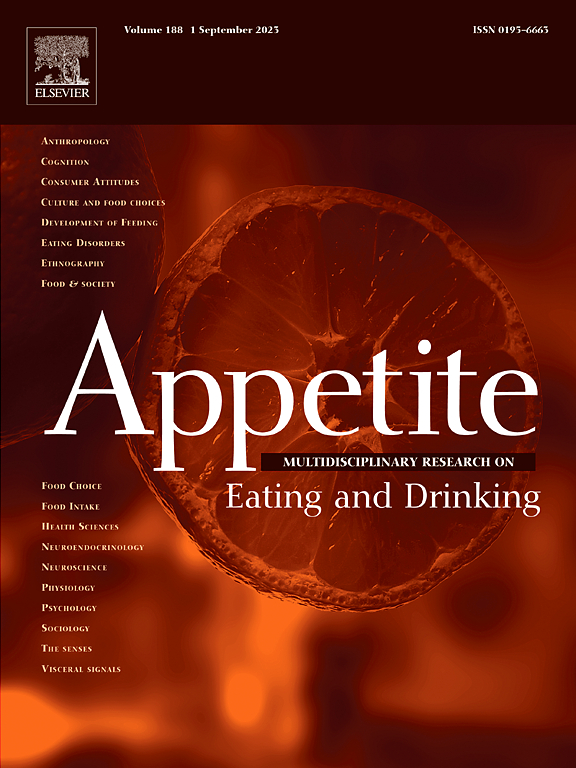Energy Intake
How to submit an article:
- Registered users can submit any published journal article that has a unique DOI (Digital Object Identifier) name or link to Research Hub.
- For example, you can paste the full DOI link:
https://doi.org/10.1109/5.771073or just the DOI name:10.1109/5.771073into the field above and click submit. - The person who is first to submit a valid article to Research Hub will forever be credited for it, and every article submission earns you +6 Research Points.
Published research studies are articles that present the findings of original research that has undergone a peer-review process and has been made publicly available in scholarly journals, books or other media.

Effects of Different Allotments of Avocados on the Nutritional Status of Families: A Cluster Randomized Controlled Trial
2021 Nov 11 Nutrients Pacheco LS, Bradley RD, Denenberg JO, Anderson CAM, Allison MA
Randomised Controlled Trial Avocado Energy IntakeHigh avocado intake significantly reduces the intake of energy and various macro and micronutrients in Hispanic/Latino families.

Dietary adzuki bean paste dose-dependently reduces visceral fat accumulation in rats fed a normal diet
2020 Apr Food Research International Han KH, Ohashi S, Sasaki K, Nagata R, Pelpolage S, Fukuma N, et al.
Animal Study Gut Microbiota Visceral Fat ObesityAdzuki bean paste consumption can reduce fat accumulation in rats by lowering energy intake and altering gut microbiota composition.

Lemon juice, but not tea, reduces the glycemic response to bread in healthy volunteers: a randomized crossover trial
2020 Mar 23 European Journal of Nutrition Freitas D, Boué F, Benallaoua M, Airinei G, Benamouzig R, Le Feunteun S
Randomised Controlled Trial Blood Sugar LemonLemon juice, but not black tea, can lower and delay the blood glucose concentration peak after consuming bread.

Consumption of dark chocolate attenuates subsequent food intake compared with milk and white chocolate in postmenopausal women
2017 Sep Appetite Marsh CE, Green DJ, Naylor LH, Guelfi KJ
Randomised Controlled Trial Type 2 Diabetes Satiety Dark ChocolateDark chocolate reduces subsequent food intake in postmenopausal women more effectively than milk and white chocolate.
Research insights are moderated by the Research Hub team and offer an at-a-glance overview of interesting research findings.

2021 Nutrients
High avocado intake significantly reduces the intake of energy and various macro and micronutrients in Hispanic/Latino families.
Randomised Controlled Trial Avocado
Effects of Different Allotments of Avocados on the Nutritional Status of Families: A Cluster Randomized Controlled Trial
Pacheco LS, Bradley RD, Denenberg JO, Anderson CAM, Allison MA

2020 Food Research International
Adzuki bean paste consumption can reduce fat accumulation in rats by lowering energy intake and altering gut microbiota composition.
Animal Study Gut Microbiota Obesity Visceral Fat
Dietary adzuki bean paste dose-dependently reduces visceral fat accumulation in rats fed a normal diet
Han KH, Ohashi S, Sasaki K, Nagata R, Pelpolage S, Fukuma N, et al.

2020 European Journal of Nutrition
Lemon juice, but not black tea, can lower and delay the blood glucose concentration peak after consuming bread.
Randomised Controlled Trial Blood Sugar Lemon
Lemon juice, but not tea, reduces the glycemic response to bread in healthy volunteers: a randomized crossover trial
Freitas D, Boué F, Benallaoua M, Airinei G, Benamouzig R, Le Feunteun S

2017 Appetite
Dark chocolate reduces subsequent food intake in postmenopausal women more effectively than milk and white chocolate.
Randomised Controlled Trial Dark Chocolate Satiety Type 2 Diabetes
Consumption of dark chocolate attenuates subsequent food intake compared with milk and white chocolate in postmenopausal women
Marsh CE, Green DJ, Naylor LH, Guelfi KJ
Review Articles
Review articles summarise and critically evaluate the current state of research on a specific topic or field by synthesising multiple primary research studies.
Clinical Trials
Clinical trials are research studies that involve people and are conducted to evaluate the safety and efficacy of new treatments or interventions, such as drugs, medical devices, or behavioural therapies.

Effects of Different Allotments of Avocados on the Nutritional Status of Families: A Cluster Randomized Controlled Trial
2021 Nov 11 Nutrients Pacheco LS, Bradley RD, Denenberg JO, Anderson CAM, Allison MA
Randomised Controlled Trial Avocado Energy IntakeHigh avocado intake significantly reduces the intake of energy and various macro and micronutrients in Hispanic/Latino families.

Lemon juice, but not tea, reduces the glycemic response to bread in healthy volunteers: a randomized crossover trial
2020 Mar 23 European Journal of Nutrition Freitas D, Boué F, Benallaoua M, Airinei G, Benamouzig R, Le Feunteun S
Randomised Controlled Trial Blood Sugar LemonLemon juice, but not black tea, can lower and delay the blood glucose concentration peak after consuming bread.

Consumption of dark chocolate attenuates subsequent food intake compared with milk and white chocolate in postmenopausal women
2017 Sep Appetite Marsh CE, Green DJ, Naylor LH, Guelfi KJ
Randomised Controlled Trial Type 2 Diabetes Satiety Dark ChocolateDark chocolate reduces subsequent food intake in postmenopausal women more effectively than milk and white chocolate.
Study Protocols
Published study protocols are detailed plans that outline the objectives, methodology, statistical analyses, and organisation of a research study that have been made publicly available for others to review and use as a reference.
Presentation Slides

Randomised Controlled Trial
High avocado intake significantly reduces the intake of energy and various macro and micronutrients in Hispanic/Latino families.
Pacheco LS, Bradley RD, Denenberg JO, Anderson CAM, Allison MA

Animal Study
Adzuki bean paste consumption can reduce fat accumulation in rats by lowering energy intake and altering gut microbiota composition.
Han KH, Ohashi S, Sasaki K, Nagata R, Pelpolage S, Fukuma N, Reed JD, Shimada K, Kadoya N, Fukushima M

Randomised Controlled Trial
Lemon juice, but not black tea, can lower and delay the blood glucose concentration peak after consuming bread.
Freitas D, Boué F, Benallaoua M, Airinei G, Benamouzig R, Le Feunteun S

Randomised Controlled Trial
Dark chocolate reduces subsequent food intake in postmenopausal women more effectively than milk and white chocolate.
Marsh CE, Green DJ, Naylor LH, Guelfi KJ
Executive Summary
Write an executive summary in the form of a blog article on the topic of "Research into Chinese medicine treatment for Energy Intake" summarising the research below and using language that can be easily understood by patients and avoiding medical jargon using a professional and caring tone of voice.
Write an executive summary in the form of a blog article on the topic of "Researched Chinese medicine treatments for Energy Intake" summarising the research below in an objective and easy to understand way, and using language that can be easily understood by patients. Group the article into Chinese medicine treatments first, followed by nutrition and other treatments. Avoid using medical jargon and use a professional and caring tone of voice.
Write me a concise but easy to understand executive summary on the topic of "Chinese medicine treatments for Energy Intake" based on the following research that I will give you. Your summary should be 2 paragraphs long in Australian English spelling and include references to the studies.
A Randomised Controlled Trial published in 2021 in the journal Nutrients found that High avocado intake significantly reduces the intake of energy and various macro and micronutrients in Hispanic/Latino families. In this research, Seventy-two Hispanic/Latino families without severe chronic disease and not following specific diets were selected. These families, each with at least three members and all residing in the same household, were divided into two groups. One group received a low allotment of avocados (three per week) and the other received a high allotment (fourteen per week). Along with the prescribed amounts of avocado, both groups underwent twelve bi-weekly nutrition education sessions over a period of six months. The study investigated the change in the families' total intake of energy, as well as macro and micronutrients as the primary outcomes. These assessments were made by comparing mean changes between groups at the end of the six months, while abiding by the intention-to-treat concept. The results showed a significant reduction in not just energy intake, but also the intake of carbohydrates, animal and vegetable protein, fats (including saturated and polyunsaturated fats), and micronutrients such as calcium, magnesium, sodium, potassium, iron, and vitamin D in the high avocado allotment group. Interestingly, the high allotment group reported a reduction of self-reported energy intake by a notable margin, much higher when compared to the decrease in the low allotment group. The study underscores the potential of culturally-appropriate plant-based interventions for improving nutritional status of at-risk families.
A Animal Study published in 2020 in the journal Food Research International found that Adzuki bean paste consumption can reduce fat accumulation in rats by lowering energy intake and altering gut microbiota composition. The study evaluated the impact of adzuki bean paste (ABP) on visceral fat accumulation in rats by administering different doses of ABP - 30% and 58.9% in their diets for a period of 28 days. ABP, being a good source of indigestible carbohydrates with fiber and resistant starch, forms an influential part of the rats' diet. The daily dietary energy intake was observed during this period, with particular attention to fecal lipid and fecal acidic sterol excretions, which were found to be increased in a dose-dependent manner. Certain observations within the body of the rats, including the condition of cecal content and fecal moisture, were also monitored. In discussing the results of administrating ABP in the diet, it was observed that visceral fat accumulation and serum lipid levels were reduced. Both groups of rats - those given a diet with 30% ABP and those with 58.9% ABP - showed significantly higher cecal acetic, propionic, and n-butyric acids and lowered cecal pH, regardless of the ABP dose. The ABP diet also reflected altered microbial community data, with higher alpha-diversities than a control group. The study further revealed through cecal bacterial 16S rRNA gene sequencing that the ABP supplemented diets also impacted the ratio of two types of bacteria, Firmicutes, and Bacteroidetes. The findings hence suggest that the cecal fermentation of fiber and resistant starch in ABP was instrumental in reducing fat accumulation.
A Randomised Controlled Trial published in 2020 in the journal European Journal of Nutrition found that Lemon juice, but not black tea, can lower and delay the blood glucose concentration peak after consuming bread. The methodology used in this research consisted of a randomized crossover study involving three test groups consuming equal portions of bread partnered with three different beverages: water, black tea, and lemon juice. Each participant's capillary blood glucose concentrations were monitored over a 180-minute period using the finger-prick method. Additionally, the participants' free-choice energy intake was assessed three hours after the bread and beverage consumption to gauge the effects of the different beverages. The results of the research showed a distinct difference between the effects of lemon juice and black tea on the glycemic response to bread. It was found that black tea didn't affect the blood glucose responses. However, lemon juice significantly reduced and delayed the peak of blood glucose concentration. It's noteworthy that the pH-lowering effect of the lemon juice performed similarly to other acidic foods, indicating that incorporating acidic drinks or foods in starch-rich meals is an effective strategy to minimize their glycemic impact. Interestingly, none of the beverages tested had an impact on the participants' ad libitum energy intake.
A Randomised Controlled Trial published in 2017 in the journal Appetite found that Dark chocolate reduces subsequent food intake in postmenopausal women more effectively than milk and white chocolate. In the study, 14 healthy postmenopausal women participated in three separate experimental trials done in a counterbalanced order. Each trial was conducted at a specific time and was spaced one week apart. The women's food intake, appetite perceptions, mood, and levels of certain appetite-related peptides were measured and analyzed following their consumption of an isocaloric amount of dark chocolate (80% cocoa), milk chocolate (35% cocoa), and white chocolate (cocoa butter). The results indicated a significant decrease in food intake after consuming dark chocolate compared to milk and white chocolate. Furthermore, blood glucose and insulin levels were found to temporarily increase after consuming milk and white chocolate, unlike in the case of dark chocolate. In addition, the consumption of high cocoa content chocolate, like dark and milk chocolate, elevated the pancreatic polypeptide, which differed from the response to white chocolate. The conditions had no significant effect on active ghrelin or leptin hormones, and the mood of the participants remained largely unaffected.
Moderation Tools
Topic
Sign In
Users not signed in are limited to viewing the 5 most recent items of content.